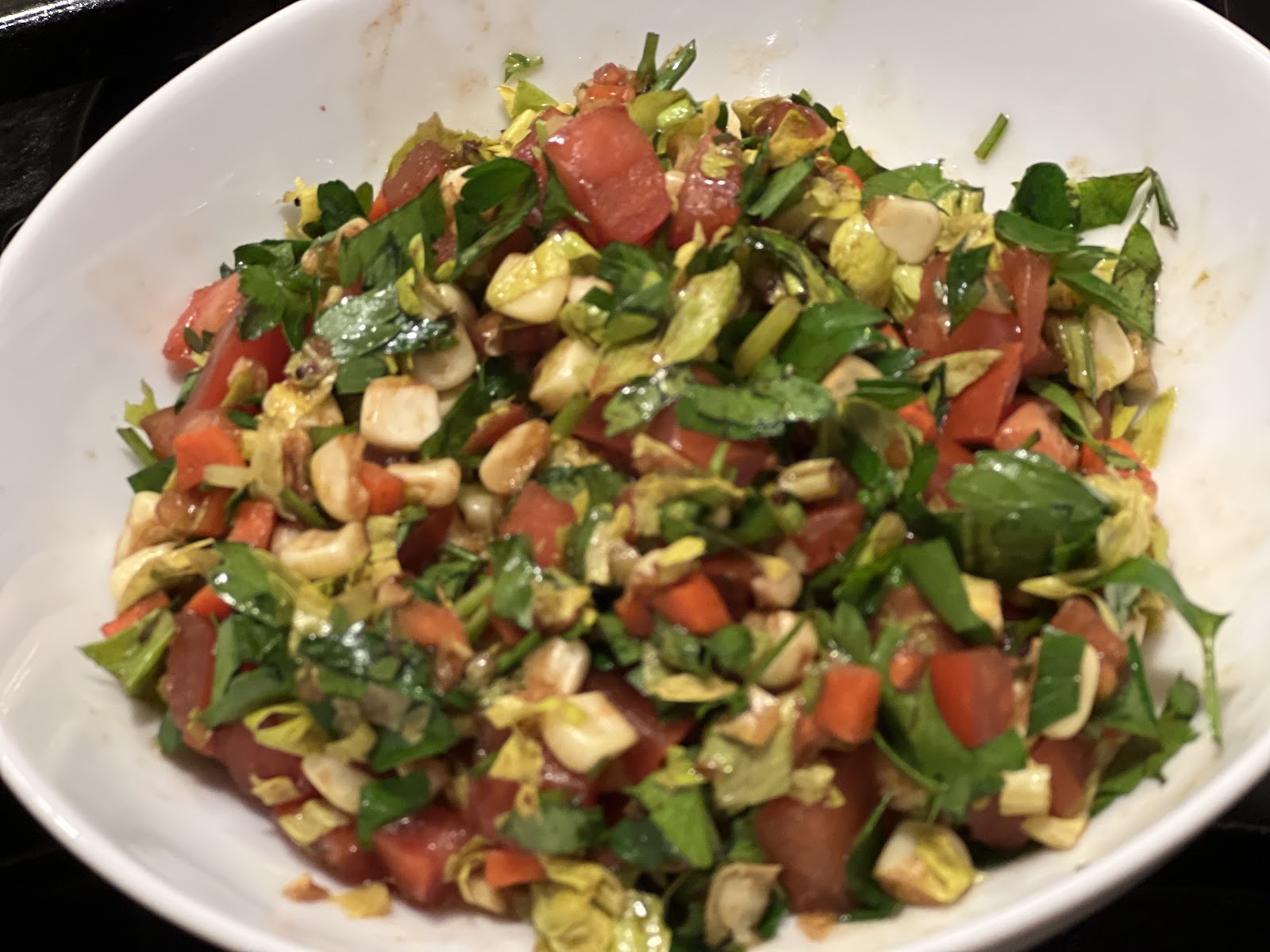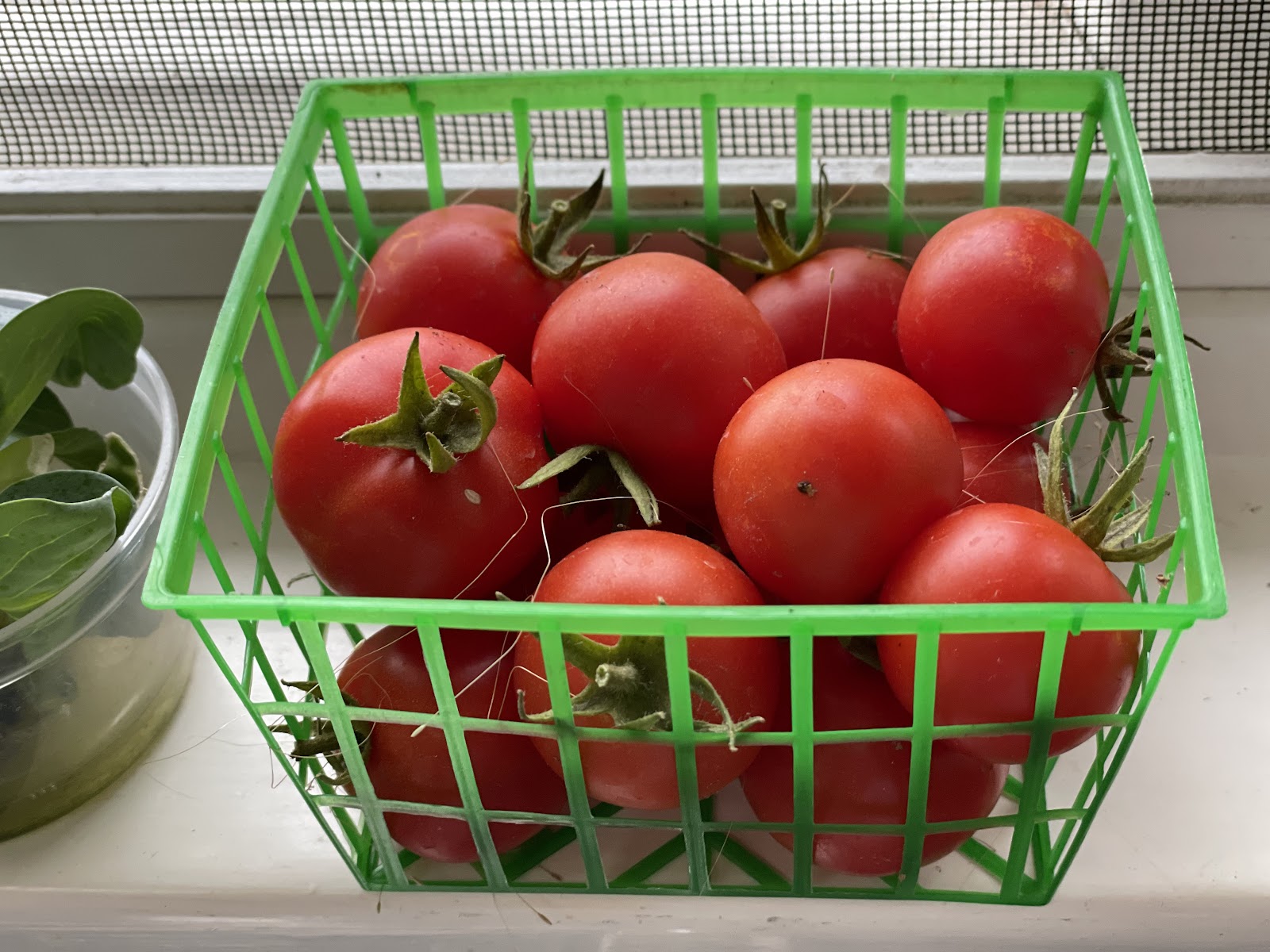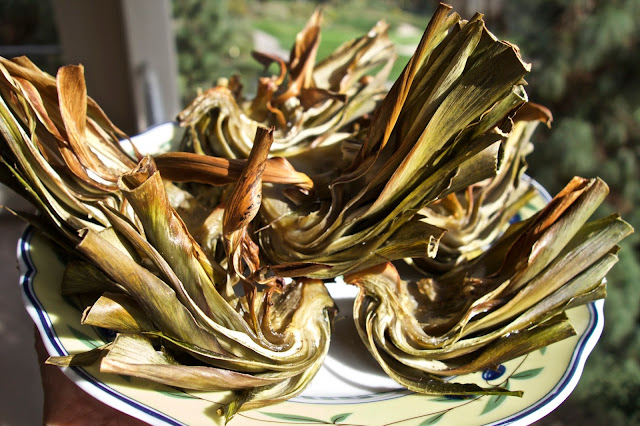Although most of the world thinks there are no seasons in Southern California, those of us

who are natives know that isn't the case. In the winter, we are very definitely cold. When my wife and I walk on the beach, she wears a full compliment of winter wear: fur lined hat, gloves, sweater, and jacket.
We also feel winter's grip when the sun disappears in mid-afternoon, requiring lights to be turned on before 5:00pm. With the cold and darkness, these are not easy times. Certainly there are pleasures to be gotten from a crackling fire in the fireplace, hot soups filled with savory bits, and braised meats surrounded by an array of root vegetables. Admittedly those are sweet comforts, but they are brought front and center because our sagging spirits need propping up.
Spring in Southern California is a different matter altogether. Although there is still fog aplenty at the beach where we live, the days benefit from the warmth of the sun's strengthening rays.

Besides sensing the increase of daylight and warmth, we also know that spring has arrived because the local farmers' markets welcome back long forgotten friends. Corn on the cob, green garlic, all manner of flowers, squash blossoms, and stone fruit beginning with plums, pluots, apricots and apriums.
With the abundance of locally grown produce, the high points of my week are visits to the Wednesday
Santa Monica and the Sunday
Pacific Palisades Farmers' Market.
As a child I avoided contact with vegetables as much as I could. My mother's treatment of produce was ungenerous. String beans were boiled in salted water and then extracted, limp and submissive. Corn and English peas were taken from the freezer and overcooked in the same salted water, their flavor saved only by the large pat of butter that joined them in the serving bowl.
Leaving home, I pursued a different path, exploring the local farmers' markets and experimenting with vegetables I had only heard about but never eaten. One of my chief discoveries was that vegetables, like hamburgers and steaks, benefited from grilling.
Who does not love carrots drizzled with olive oil, seasoned with sea salt and black pepper and cooked on a hot grill? Their carrot-essence acquires a caramelized sweetness that is irresistible. And what about the improvement of artichokes, Japanese eggplant, broccoli, corn, squash, zucchini, and even thin slices of Yukon Gold potatoes similarly coated with seasoned olive oil and placed on the grill?
So powerful are those flavors, I have to restrain myself from grilling every night.
Just about any vegetable can be grilled. Some, like tomatoes and asparagus, cook quickly and require an attentive hand to prevent charring. Others, like corn on the cob, take a bit longer and need to be turned frequently for even cooking.

A few, like artichokes, require fifteen-minutes in boiling water before heading to the grill.
Grilling pulls out the essential flavor of each vegetable. Those qualities are enhanced by a simple dredging in olive oil seasoned with sea salt and freshly ground pepper.
Once grilled, the vegetables can be served straight off the grill as a finger-food appetizer, a side dish, or even as an entree. But they can be so much more.
Chopped up, grilled vegetables can fill out a parsley salad. Mixed with couscous they make a savory side dish.
Once you start grilling vegetables, they'll become a secret weapon in your culinary adventures.
Grilled Vegetables
Yield 4 servings
Time 45 minutes
Ingredients
4 large carrots, washed, peeled, cut into slabs 1/4" thick, 2" long
2 broccoli crowns, washed, cut into slabs 1/4" thick, 2" long
1 bunch asparagus, medium sized or thick, washed, white ends trimmed off
1 ear of corn, husks and silks removed, washed
2 tablespoons extra virgin olive oil
1/4 teaspoon sea salt
Pinch of black pepper
Method
Turn the grill on to medium and preheat for 10 minutes.
In a bowl, toss the vegetables and season with the olive oil, sea salt and pepper. Using tongs, put the vegetables on the grill.
Close the cover and cook for 2-3 minutes. Turn and cook another 2-3 minutes, checking frequently to prevent burning. How long each vegetable takes to cook depends on your grill, the vegetable, and the thickness of the slices.
Have a serving plate handy so you have a place to put the cooked pieces when they're ready. Serve hot as a side dish or room temperature as finger-food appetizers.
Grilled Vegetable Chopped Salad
Cut the corn kernels off the cob. Roughly chop the other vegetables. Toss together. Add a bit more olive oil, taste, and adjust seasoning with sea salt and pepper.
Grilled Vegetable and Parsley Salad
With the grilled vegetables as a starting point, the salad can be expanded by adding elements. In this case, parsley.
Ingredients
3 cups grilled vegetables, roughly chopped
1 bunch Italian parsley, washed, most of the stems removed, leaves finely chopped
1/2 cup crumbled feta
Olive oil
Sea salt and pepper
Method
Mix together the chopped vegetables and parsley. Add more olive oil as needed, taste and adjust seasoning with sea salt and pepper.
Variations
Add 1 avocado, peeled and chopped
Add 10 fresh cherry tomatoes, quartered
Add 1 tablespoon chopped scallions or red onion
Substitute cilantro for parsley
Add 1 hard boiled egg, finely chopped
Couscous Salad with Grilled Vegetables and Parsley
The salad becomes more substantial with the addition of easy-to-make couscous.
Yield 4 servings
Time 20 minutes
Ingredients

1 cup whole wheat couscous
1 1/4 cups water, boiling
Olive oil
Sea salt and pepper
Method
Mix together 1 cup whole wheat couscous, the heated water, and 1 tablespoon olive oil. Stir well, cover with plastic wrap and set aside 10 minutes, then fluff and cover again until needed.
In a bowl, mix together the chopped vegetables, parsley, and prepared couscous. Add a bit more olive oil, taste and adjust seasoning with sea salt and pepper.
Variations

Add 6 grilled mushrooms, roughly chopped
Add 1 fresh avocado, roughly chopped
Add 10 grilled shrimps, roughly chopped
Add 1/4 cup crumbled feta or goat cheese
















































